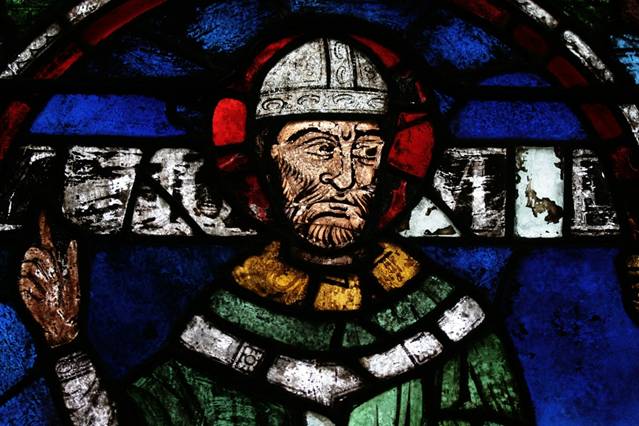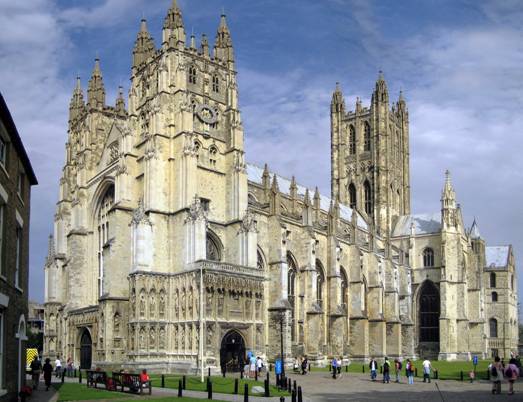TCEP Citizenship
Eight hundred and fifty years ago, on the second day of June in the year 1162 A.D., Lord Chancellor of England Thomas Becket was ordained a priest; the following day he was consecrated Archbishop of Canterbury. The remainder of this story is now history.
Thomas Becket was nominated for the post of Archbishop of Canterbury in 1162,
several months after the death of the previous Archbishop of Canterbury, Theobald of Bec. Thomas's election was confirmed on 23 May 1162 by a royal
council of bishops and noblemen. King Henry might have hoped that Becket would
continue to put the royal government first, rather than that of the church,
but instead, Archbishop Becket began leading a life of abstinence and
dedication to his role of leading the church.
Thomas Becket was ordained a priest on 2 June 1162 A.D. at Canterbury; on the
following day, 3 June 1162, he was consecrated as Archbishop by Henry of Blois,
the Bishop of Winchester and the other suffragan bishops of Canterbury.
A rift grew between King Henry II and Thomas Becket, as the new Archbishop
resigned his Chancellorship and sought to recover and extend the rights of the archbishopric. This led to a series of conflicts with the king, including that
over the jurisdiction of secular courts over English clergymen, which
accelerated antipathy between Becket and the king. Attempts by King Henry to
influence the other bishops against Becket began in Westminster in October 1163, where the King sought approval of the traditional rights of the royal
government in regard to the church. This led to the Constitutions of
Clarendon, a set of legislative procedures passed by King Henry II on 30 January 1164, which Archbishop Thomas Becket was asked to sign off on the
King’s rights or face political repercussions.

Creative Commons G.N.U. Free Documentation Licence.
Thomas Becket was born in Cheapside, London, probably in the year 1120, on 21 December, the feast day of Saint Thomas the Apostle. Thomas was the son of Gilbert and Matilda Becket. Gilbert Becket was a wealthy Norman from Rouen who dealt in city rents and properties.
When he was ten years of age, Thomas was sent as a student to Merton Priory in England and later attended a grammar school in London. Sometime after he began
his schooling, his father suffered financially, through it seems the great
fire of 1133 starting in his house and burning down so much of the city that
his properties were seriously deminished and he reduced himself to comparative poverty.
About 1140 A.D., Gilbert first secured a place for his son in the business of
a relative, Osbert Huitdeniers (whose surname in English is Eightpence) as
sheriff’s clerk, giving him his first taste of royal administration. Later
Thomas acquired a position in the household of Theobald of Bec, by now the
Archbishop of Canterbury.
Theobald entrusted Thomas Becket with several important missions to Rome and
also sent him to Bologna and Auxerre to study canon law. In 1154, Archbishop Theobald named Thomas Becket as Archdeacon of Canterbury. Other ecclesiastical
offices held included a number of benefices, prebends at Lincoln Cathedral and
St Paul's Cathedral, and the office of Provost of Beverley. His efficiency in
those posts led to Archbishop Theobald recommending Thomas Becket to King Henry II for the vacant post of Lord Chancellor, to which Becket was appointed
in January 1155.
As Chancellor, Becket enforced the king’s traditional sources of revenue that
were exacted from all landowners, including churches and bishoprics. King Henry even sent his son Henry to live in Becket's household, it being the
custom then for noble children to be fostered out to other noble houses. The younger Henry was reported to have said Becket showed him more fatherly love
in a day than his father did for his entire life. An emotional attachment to
Becket as a foster-father may have been one of the reasons the younger Henry
would turn against his father.

Canterbury Cathedral. Commons Creative Licence.
Reference sources used:-
(a) Thomas Becket: http://en.wikipedia.org/wiki/Thomas_Becket
;
(b) King Henry II: http://en.wikipedia.org/wiki/Henry_II_of_England
;
(c) London 800 – 1216: The Shaping Of A City, page
212.
Copyright Richard West. Page updated 20 November 2012.